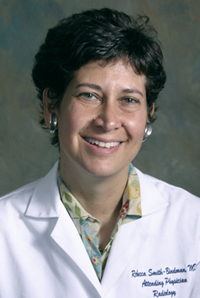Breast Cancer Risk Can Be Lowered By Avoiding Unnecessary Medical Imaging
UCSF Analysis of IOM Report on Environmental Causes of Breast Cancer Suggests There is at Least One Way Women Can Reduce Risk
A report issued by the Institute of Medicine (IOM) last December reviewed all the available scientific data compiled to date about potential environmental risks of breast cancer — factors such as pesticides, beauty products, household chemicals, and the plastics used to make water bottles.
 Rebecca Smith-Bindman, MD
Rebecca Smith-Bindman, MDCommissioned by the breast cancer foundation Susan G. Komen for the Cure, the IOM report concluded that there was not enough data to confirm or rule out that exposure to most of these factors caused breast cancer. However, the report did identify two factors that definitely increased risk: post-menopausal hormone replacement therapy and radiation exposure from medical imaging.
Now, a special article in the journal Archives of Internal Medicine details the findings of the IOM report as they relate to medical imaging and what women can do to minimize their risk of breast cancer.
“The single thing that the IOM highlighted that a woman can do to lower her risk of breast cancer is to avoid unnecessary medical imaging,” said Rebecca Smith-Bindman, MD, a professor of radiology and biomedical imaging, epidemiology and biostatistics at UCSF, who wrote the article, and who contributed to the IOM report.
What a Woman Should Know to Ask Her Doctor
While CT scans and other forms of medical imaging have revolutionized medicine and can be life-saving, said Smith-Bindman, women need to engage their doctors in the decision-making process and insist on the necessity and safety of all radiological scans they undergo.
“They should understand the risks and benefits and ask their doctor to explain the risks and benefits,” said Smith-Bindman.
More About Biomedical Imaging
Radiation Exposure From Medical Imaging Has Increased Even at HMOs
She suggested that patients ask their doctors questions like:
- Is this scan absolutely necessary?
- Is it necessary to do it now?
- Are there other, alternative tests?
- How can I be sure the test will be done in the safest way possible?
- Will having the scan information change the management of my disease?
- Can I wait until after seeing a specialist before getting the scan?
The article, “Environmental Causes of Breast Cancer and Radiation from Medical Imaging/Findings from the Institute of Medicine Report” by Rebecca Smith-Bindman appears in the Archives of Internal Medicine on June 11, 2012.